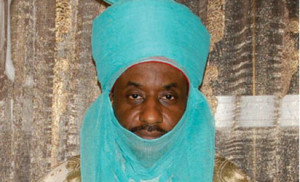Whatever the motivation for the 14th Emir of Kano, Muhammad Sanusi II, his decision to demolish some tombs of historical value in the Emir’s palace may send the wrong signal to some people, especially at a time the United Nations, UN, and other global bodies are frowning at the imbecility of the terror group, Islamic State of Iraq and the Levant (ISIL, also known as ISIS – Islamic State of Iraq and Syria or IS – Islamic State) and its destruction of historical sites since 2014 in Iraq, Syria, and Libya.
Muhammad Sanusi II, the indefatigable 14th Fulani Emir of Kano, may not have lost his touch with daring where even angels fear to tread. From his days at the Central Bank of Nigeria,CBN, where he was Governor, courting controversy was never alien to him. He may have imported same into the Kano Emirate.Whereas, Salim Ado Bayero, the son of the late Emir Ado Bayero, dragged Sanusi to court, obtaining an injunction stopping further attempts at destroying some tombs within the palace, it was a surprising twist in the unfolding drama when, last Thursday, the plaintiff directed his lawyer to withdraw the suit. This report will not argue against the intentions of Emir Sanusi but would counsel on the need to preserve historical tombs. It will also show that the destruction of tombs by ISIL in the Middle East, no matter the justification, need not creep into Nigeria – or Kano, for that matter.
For instance, when Sanusi II recently sacked his senior cousin and in-law, Sanusi Ado Bayero, as Ciroman Kano, the nine million city dwellers were not aghast because pundits saw it coming.
But barely a week after that, the people of the city got to know, through Salim Ado Bayero, that there was an alleged plot to demolish historical sites within the centenary old palace.
According to information available, the demolition was to pave the way for the construction of offices for 44 Hakimis or District Heads.
Bayero dragged the Emir to court. He, subsequently, secured an injunction restraining the monarch from tampering with the palace structure pending the determination of the suit before it.
In a writ of summon filed before Justice A T Badamasi, the plaintiff flayed Sanusi for allegedly plotting to erase history by destroying no fewer than 13 tombs of former Emirs buried within the palace.
The Emirs, whose tombs will give way to office building, were listed to include but not limited to Emirs Sulaiman and Ibrahim Dabo – the founders of the Fulani dynasty – Emir Bello and Emir Usman 1.
These past Kano Emirs, during their individual reign between16th century through the 18th century, collectively elevated the ancient city to its state of glory that has made it one of stature today – these are treasured historical sites.
Consequently, Bayero’s pursuit at the court of law generated goodwill and solidarity against the intention of Sanusi II.
But in a dramatic turn of events, the Kano Prince suddenly instructed his attorney to discontinue with the case.
Bayero’s Attorney, Sanusi Umar Sadiq, told Sunday Vanguard on phone, last week, that the royal family had resolved to settle out of court.
Sadiq said that, already, he had filed a withdrawal notice in line with the directive, adding that the matter was slated for hearing last Thursday.
The lawyer said: “Bayero family has agreed to settle out of court and we have filed withdrawal notice before the court.”
Meanwhile, the action made a mockery of an earlier Kano High Court order, which restrained the Emir from either demolishing or tampering with any structure in the Emir’s palace pending the hearing of the motion on notice.
Justice A T Badamasi, making the order, also restrained Sanusi and the Emirate Council from giving quit notice or evicting any person residing inside the palace known as Gidan Rumfa until the determination of the substantive suit.
“The order further restrained the first and second defendants/ respondents from giving quit notice or evicting any person resident in the Emir’s palace by virtue of being Bayin Sarki, pending the determination of the substantive application.“Badamasi directed the parties involved in the case to maintain the status quo.“The counsel to the plaintiff alleged that the Emir and the Emirate Council were seeking to destroy the grave yard which housed the tombs of 13 former Kano Emirs.“Sadiq said the plan to demolish the structures in the palace was capable of killing the ancient tradition Kano Emirate Council was known for.
But, on Thursday, the judge set aside the celebrated case against Sanusi II on the strength of the application from Bayero seeking the withdrawal of the matter. Badamasi, however, said he could not grant the prayer for the N20 million damages requested by the Emir’s lawyers because the plaintiff is a direct descendent of Abdullahi Bayero, and, therefore, as his grandson, he will not be happy in his grave if the case went the other way.
The judge maintained that the plaintiff had the right to withdraw the case because it was even at its preliminary stage, adding that neither cost nor time was wasted on it.
With the ruling, there may have been indeed a green light for Sanusi II to proceed to carry out the demolition of the tombs.
While not attempting to draw a parallel between the demolition adventure of ISIS and what the Emir of Kano is proposing, there is need to subject the present situation to further interrogation on the basis of the education and historical representation of the tombs in the palace of the ancient city.
Whereas it is a trite religious belief that human remains should not be deified or elevated to the idolatry status of shrines, the tombs in that palace are representations of the historical heritage of the illustrious emirate, just as it serves to connect the present to its pre-eminent past, in a manner that makes the imbecility of ISIS more pronounced (see next piece).
END


Be the first to comment